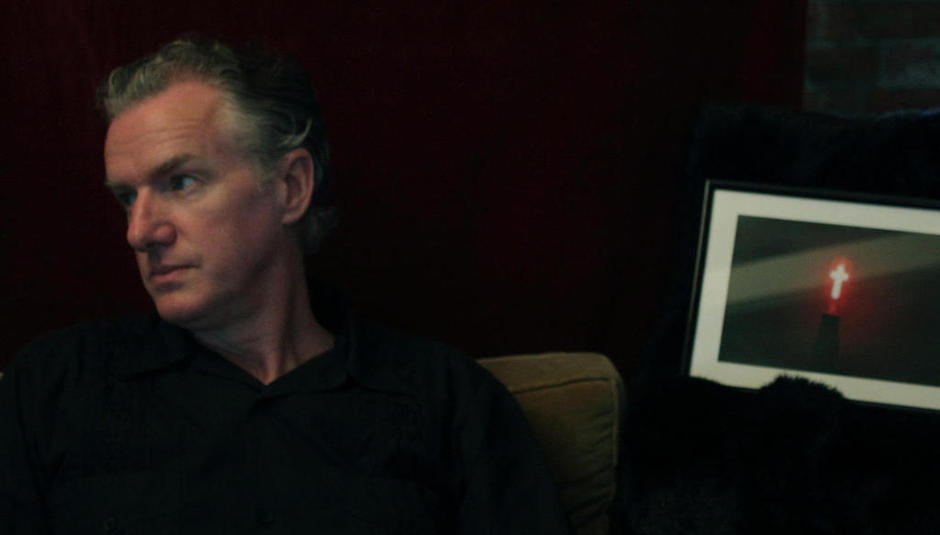"I mean, I suppose people are expecting me to say, Nick Cave’s a…" Mick Harvey, sipping sparkling mineral water in one of the Cumberland Hotel’s many lounges, mumbles a word that sounds an awful lot like cunt. "But it’s not like that. We still talk. A bit."
The right hand Bad Seed, no longer a Bad Seed, is in a good place. In a positively ebullient place, indeed. Halfway through our interview, some grumpy-looking chap he’s meeting afterwards walks into the room, nods to us, and sits down at the bar. "Oh, that’s Ian, GRAB A DRINK IAN!" Mick yells, reminding me of that bit in ‘We Call upon the Author’ when someone shouts ‘Hey Doug, how you been?’ A few minutes later, a blender roars. "Starting with a margarita Ian? Take it easy! HAHAHAHAHAHAHA." A few more minutes, and the only other people in the room wander off. "See you later HAHAHAHAHA" And he actually waves.
The more Bad Seeds I meet on my way to ultimately sitting down with Nick (or so the plan goes) the more convinced I become that I’d do better to just stick with Jim, Warren et al. If an opportunity ever availed itself, I’d probably spend weeks worrying about how not to be like Zane Lowe and make a mess of it. It’d be difficult to not have a great time with Mick Harvey, though, and I’m not just saying that because we’re both vicars’ sons ("We do tend to excel apparently. I’ve read an analysis of it, the sons and daughters of Anglican ministers, it’s quite extraordinary, what they go on to. We’re some kind of incredible multiplication more successful than the average person.") He is, two years on, a man very obviously at peace with what must have been a hell of a wrench of a decision. He and Nick first started playing together at the age of fourteen.
A peace, that is, which has resulted in a record about war and a record about death released within a couple months of one another, but let’s not get all psychoanalytical about it. As many critics argued, Polly Harvey’s majestic Let England Shake is all aquiver with a musical energy at odds with its subject matter. And it’s obvious that Mick’s work as multi-instrumentalist backing-singing co-producer on that record (and the subsequent PJ Harvey tour) has re-energised him as a musician – and given him the opportunity to slot back into the kind of collaborative role he thrives in. He’s more willing to talk about PJ’s record than he is his own.
"The concerts have just been amazing," he says, suddenly rather serious. "I can honestly say that the recent shows with Polly have been the most challenging and rewarding thing I’ve done as a musician playing in a band situation for a long time. What’s required of me is very challenging up there, all the singing that’s on the album, we’re just singing all night, us guys. I think the last four songs of the set, as it was recently, I sang all those songs from start to finish. With the last one I sang the first verse myself, and the other ones I’m singing with Polly in unison through the whole song. And playing piano and stuff – and I’m like, fumble-fingers…"
It quickly becomes apparent that there’s a lot of Mick Harvey, both personal and musical, in Let England Shake. He and Polly Jean researched it together ("we went on trips to the Imperial War Museum and places in Australia") for a start. I ask if the album’s focus on the Anglo-Australian Gallipoli campaign is a reflection of the two Harveys’ respective nationalities, but he’s generally unconvinced by the idea that the record is about specific national identities at all, interestingly:
"Certainly the English press have taken a very strong angle about it being English, but I think what’s important is that she’s speaking out of the voices of other people, really, and using them to get to universal ideas about patriotism and nation. I think she found the [Anglo-Australian] connection by coincidence, it’s kind of incidental that she used things about Gallipoli – they were simply the things that gave her an avenue into the ideas. That gave her strong feelings about the things she could adopt and write about."
This quality of insight is, undoubtedly, the product of a form of partnership that goes far beyond two like-minded musicians simply playing their instruments together. But then, collaboration is Mick’s life’s work. Despite the fact that we’re supposed to be talking about his new solo record, he keeps repeating "I’m not normally a songwriter," and so I figure I might as well try to get to the heart of what it is about collaboration that so catalyses his musical energies. Not an easy question to answer, apparently.
"The main thing about collaboration is that it’s what most musicians are doing but it’s the one thing that doesn’t really get observed or analysed very much. The problem is, it’s really indefinable and it’s actually really boring to write about – but it’s fundamental to what a lot of people enjoy about what they’re listening to. So when I just say, “that’s what I do,” it’s because I’ve realised, particularly with my new album, that it just feels really boring talking about the band, who else is on the album etc. I realised why people like Polly and Nick don’t talk about the band in interviews – there’s just not that much stuff you can say about it, except that they’re fantastic and it was great working with them."
I press him, though, and he has another go at explaining...
"It’s all about getting that chemistry going, that’s how music works. When we were recording Polly’s album for instance, there was something really good going on in the way we were playing together, and you kind of know that will come across. When you play with someone else, you actually lock into a different thing, there’s an interaction and you find a different feel by doing that. And you can’t fake that. That’s music to me. But the main reason I collaborate is because I’m not really a songwriter, so I end up in situations where my job is to always make the music as good as it can possibly be. I always feel that’s my job, to try and finish the music. That’s my focus from the beginning."
Throughout the films accompanying the new Nick Cave re-releases, the interviewed Bad Seeds fulfill their own stereotypes to a thoroughly enjoyable extent. Blixa: reeeal intense. Thomas: reeeal German. And Mick? Practical. Unpretentiously pragmatic. This word, ‘job’, comes up several times, most significantly during the Boatman’s Call interviews, when he explains that record represented the first time he didn’t do ‘my normal job’ – staying behind and making the music as good as it could be. Murder Ballads having been a ‘turning point,’ the "end of my influence". Somewhat inevitably then, the tacit suggestion that recent projects have afforded him the opportunity to once again take on this favourite role, makes me want to ask about the band he left which stripped him of it a decade ago.
Except that since leaving the Bad Seeds another major project has, ironically enough, been overseeing the remastering of all 14 reissues, so it’s not quite as simple as that. Has that been a somewhat bittersweet experience, considering the circumstances?
"It’s pretty weird. I don’t think it’s really bittersweet, though. I find them fascinating, you know, they’re really interesting to hear again, for the most part they’re as I remember them and then occasionally I’ve changed my opinion about an album I’m working on. I suppose the most obvious one would be Henry’s Dream which I think we always felt the production messed up, but it was actually really well recorded, the performances are great, it was just mixed badly. Twice."
It’s clear, though, that Mick has thought deeply about the latest batch of re-releases, and he soon expands on the sentiments expressed in the film:
"Let Love In and Murder Ballads are the last two where it was the band being given free rein to drive the music in a direction – which obviously Nick was involved with too, at that stage he was in the band too – but it was given to the band to make it happen. And it would fall to me in the later stages of the recording to finish overdubs etc. Those recordings have got my fingerprints all over them. Even the music that Nick would bring, in those days he’d play it on the piano, and he’d be like [gesturing, silly voice] “I want this bit to be really, y’know, dummmm” like that, and it was up to us to work out how to play the damn thing. Everyone had to make up their parts; at that point it was a really collaborative work which was a constant with the Bad Seeds, it was very much a band functioning properly."
These little digs at Nick flare up every now and then, and in a world in which nobody has a bad word to say about The Great Nick Cave anymore, are really rather refreshing. Not to mention mostly affectionate, which is something of a relief. And so when I mention Bunny Munro, I get the following: "I haven’t read the book, it came out very shortly after I’d left the Bad Seeds and the last thing I wanted to do was sit around reading Nick’s book. But I can be almost certain about the kind of writing style he’ll have been trying to employ, without having read it. Obviously it’s Brett Easton Ellis and he’s trying to do some updated working of F. Scott Fitzgerald." Obviously.
And when I ask whether his ecclesiastical background means he shares Nick’s lifelong obsession with biblical imagery, Old Testamental melodrama and so on, I get this:
"From the Birthday Party onwards it was always a little bit like, “he’s still going on about this stuff? I got that out of my system when I was a teenager!” No, it was never what interested me about his work. In fact, I would have preferred it if some of those elements were just not there, actually. With Grinderman, Warren laid down the rules about it. He said something like, “you’re not allowed to write about Jesus, y’know, and love etc.” And Nick just said [silly high-pitched voice] “Well what am I going to write about then?” And that’s why he’s written all those strange songs."
Ah yes, Grinderman. "They pinched my drum beat for [the Birthday Party’s] Dead Joe for their opening single – that’s a good joke, they know that full well!" I ask if Grinderman were a factor in his decision to move on, and he’s initially wary: "I like Grinderman and I think it’s a healthy parallel project for Nick to be having, that’s injected a lot of new energy. Whatever you think about them – sometimes they’re fundamentally puerile and not even funny – but that’s the game, that’s the way they’ve got to be, what they’re trying to do, some of it’s going to work and some of it isn’t, you have to accept that. But I think both albums are really good, actually."
Not directly, then, but certainly a part of the beginning of the end:
"I said to Nick, after Grinderman, “how’s this going to work? It’s inevitable that attitudes and aspects of what’s happening with Grinderman are going to come into this project.” And he was like [deadly serious voice] ‘no, I don’t want it to be like that, I want it to be like really [karate chopping] y’know, divided, and then it’s going to be back to a Bad Seeds record” and I was just thinking “how’s that going to work?” But by the time it got to the eve of the record he was like [screechy voice] “no no we’re gonna, y’know, aaarrgh” and he’d completely realised – his head was just in a different place."
"A new album is inevitably what it is, you can work with that. But the way it affected the way we were playing some of the older songs – I wasn’t too happy about it. It was the attitude that had come into play of, “we’ll just bang it out,” as though that was what was good about what we were doing. And actually, that’s just a dumbed-down version. I didn’t really like that. I thought it was a waste – I see playing live and playing that material as an opportunity to do something exciting and challenging, rather than just trimming it down and bashing through it like it’s some kind of stadium rock song. Just didn’t really seem to be relevant to the Bad Seeds’ back-catalogue. I don’t think the Bad Seeds are actually even good at doing that sort of thing."
In short, it all comes back to those pre-Boatman’s Call records. It’s clear that whilst Mick could be philosophical about the band, and his role within it, evolving (in another interview he talks about the significance of the Bad Seeds’ ‘empathy with Nick and what he was trying to do’ during the later records) when that evolution began to impact upon what he’d achieved with the Bad Seeds previously, it was time to go. Fair enough – it’s only in talking to somebody as invisibly instrumental as Mick that you get a sense of quite how much he did do. Take a record like Your Funeral…My Trial: "The band just wasn’t there, Barry left, Tommy hurt his arm and was a one-armed drummer, and I was left with Nick who thought he couldn’t play anything, and Blixa who just had his guitar thing that he could do. I had to play just about everything else."
Perhaps unsurprisingly, then, Mick’s own record, Sketches from the Book of the Dead, sounds a lot more like Murder Ballads than it does any other Bad Seeds album, and not just because the songs are all about dead people. There’s a rather traditional robustness to the songwriting that’s a whole world away from the experimental soundscapes of a recent Bad Seeds track such as, say, ‘Night of the Lotus Eaters’. I ask whether this is a reflection of his discovering the essence of his musical preferences working alone for the first time, and his modest response reveals that it’s the right question, but framed in the wrong way…
"I think that happens with everything you do, you keep discovering things about your musical preferences every time you start playing stuff, you find your way into things and it’s often surprising what you’re doing. I’d basically written a couple of these songs about four years ago, and I realised there was an idea for a broader project and that I’d have to write it, which was pretty daunting. I didn’t even know if I could do it, actually. As for my musical preferences, it was more that everything musical in there had to be very specific to what the lyrics were, the subject matter on each individual song, so I almost felt like I didn’t really have control over the musical stylisation of the album. I’d be like, “how can this be sung so that it’s got the atmosphere I want to convey?” And then the music just had to be there with that. That’s why it’s very reduced down a lot of the time, it had to be completely non-intrusive really, or as non-intrusive as possible whilst still being some sort of music."
…The essence of Mick’s musical preferences isn’t something as banal as style or genre; it’s about seeking a perfect harmony of practice and product. Be that in terms of converting the energy of a collaborative process into recorded music, or losing control of one’s own stylistic control in order to preserve the integrity of an atmosphere or lyric. It’s why even when his records don’t work – and Book of the Dead doesn’t, quite – they’re far more interesting than the stuff made by the dominant majority of musicians who only understand one or the other. Who know only half of what Mick Harvey knows, in other words.
Mick Harvey will be playing his first solo date in the UK since 2007 on June 5th at XOYO in Shoreditch.






















